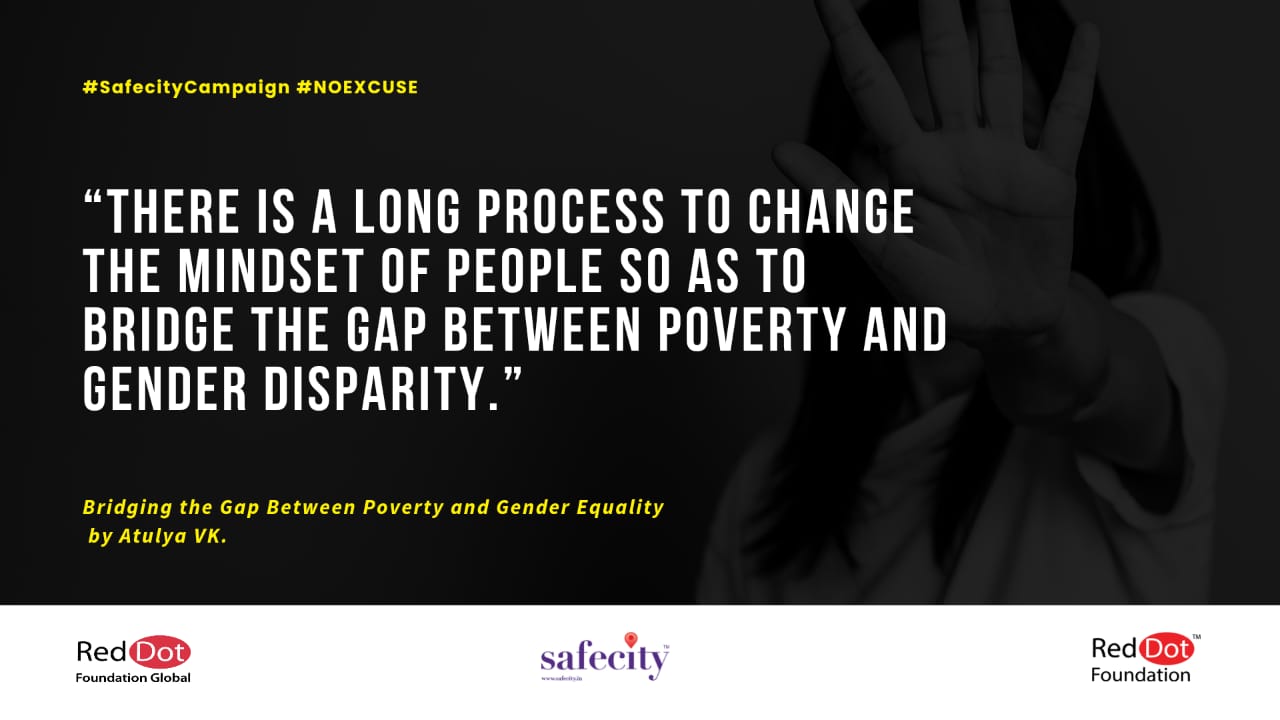Bridging the Gap between Poverty and Gender Equality

By Atulya VK.
I’m sure you’ve come across the saying that ‘Money rules the world’ and it certainly is an integral part of society with its ruling power and potential to change various outcomes as most of the activities performed are highly dependent on its availability. It might not be initially considered a core surviving element, but it certainly acts as a medium for achieving those needs. In a sense, it’s like a joker card that could determine your benefit or loss depending on the type of game you intend to play with it. But of course, there are various perspectives to look at a particular aspect, right? And the lack of money is just one of the many reasons that lead to poverty.
Poverty is a reality in many countries. It’s a situation we observe daily, something that we are programmed to ignore as the reality of life. We might be well provided for, but a vast majority of the population is still striving for a plate of food on a daily basis. Although countries like the USA might not face the consequences of poverty as severely as third-world nations, they persist to some extent in the form of racial disparities. While it’s clearly visible in developing and underdeveloped countries, their weak economic status results in a lack of knowledge and awareness, education, political participation, and equality. This is also observed in India, where opulent, towering skyscrapers are bordered by surviving slums, projecting a stark contrast between the two opposing societal groups. Apart from this, government issues regarding deregulation of the labor market causing increased instability in employment in the European Union and the African countries’ difficulties in regulating their poverty, along with their internal and external problems like famines, droughts, etc., are some of the issues faced. Whereas in Asian countries like Japan and Korea, one could observe the increased poverty caused by income inequality as one of the factors leading to psychological stress and suicidal thoughts among individuals.
Poverty is also observed to be interrelated with struggles to obtain food and education, along with the underlying problems of gender inequality. Thus, it leads to the feminization of poverty, where poverty and gender disparity could be heavily impacting each other as the increasing male preference in the economic sector might lead to women receding back to poverty. On the other hand, the increasing poverty, especially due to its raging population, might be one of the core reasons for the insufficiency of resources among the family, leading to the prioritization of males over females. Following are some of the many effects:
Restrictions: The effects of poverty could highly differ among males and females. The men might still have their freedom, individuality, and right to make decisions, while women, being the honor of their family, might be forced to be dutiful, get married, and focus on the house rather than their individuality.
Economically underprivileged: Poverty does take its toll on educational goals, where families would prefer to fulfill the male child’s aspirations. And even currently, we see the girl child being pulled out of school due to financial problems. This deprivation of education may increase the dividing gap between male and female employment opportunities due to the lack of a professional degree or certificate required for the job. Further, the lack of family and spousal support can be a major factor in restricting women from exploring their potential.
Patriarchy: Upon close observation, think about it: why is the male preference undeniably more along the poverty lines? Well, because they find boys to be more reliable subjects to provide for their families and earn in the future than their daughters. This leads to the horrific practice of female foeticides as a side effect of the continual male preference within poor societies.
Safety: Moreover, men in this social strata could get involved in crime and ill practices in order to make their livelihoods, while women are more vulnerable to sexual exploitation, including human trafficking. The problems of domestic violence and abuse cases are also more prevalent in poor societies due to women’s economic dependence and lack of knowledge regarding their rights.
Well, we can’t change the mentality of underprivileged societies all of a sudden, as this is what they’ve been believing all along, and in order to make a streak of change, it is important to provide women with equal opportunities as men. Earning opportunities can be seen as a huge struggle for women from disadvantaged backgrounds, as preference for male applicants is still very prevalent even among affluent work cultures. However, certain onsets of change can be witnessed as women are seen to start their own small-scale business setup, striving to rise from their poverty-ridden situation, like, for example, the Dharavi markets, Gwangjang market in South Korea and Ima Market in Manipur, which are operated together by women’s collective production efforts. However, a combined effort of people along with government provisions for equal facilities regarding education, food, and protection of the physical and mental state of women could bring about a greater change in the future.
